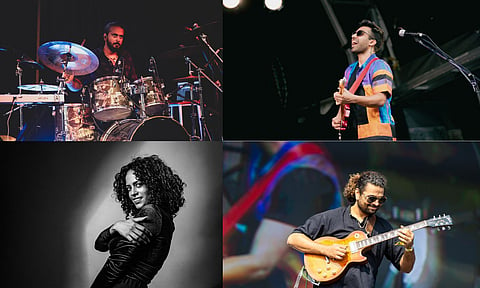

CHENNAI: The rhythmic intricacy of a mridangam’s thani avarathanam seems to amalgamate harmoniously with the syncopated funk of the jazz. This is a musical meeting which drummer Vishnu Reddy quite fondly knows. He divides his time between the high progressive metal band Maneating Orchid from Bengaluru, session work, and music education.
“There has been a delay in jazz adoption in South India compared to northern hubs like Delhi and Kolkata. Chennai never had that jam session culture until recently with Unwind Centre. Places like Delhi’s Piano Man have cultivated jazz for years through open collaborations.”
With Carnatic Jazz, his perspective somewhat balances reverence with realism. “The Carnatic scene remains orthodox – many believe in preserving purity. But innovation shouldn’t threaten tradition; they can coexist.”
Vishnu traces fusion’s lineage to pioneers like the Shakti – John McLaughlin and Zakir Hussain’s 1970s project, citing that this dialogue isn’t new, just newly normalised. “Bands like Agam and Project Mishram prove this fusion has lasting power. But full acceptance? We’re not there yet.”
Adapting Carnatic rhythms to jazz contexts requires both technical skill and cultural sensitivity – something which the Tamil Jazz Collective has been trying to establish. It was founded by Harini Iyer, whose musical journey is one of evolution, rebellion, and rediscovery.
Born into a traditional Tamil Brahmin family, Harini was introduced to Carnatic music and Bharatanatyam at the age of seven. But, she covertly indulged in pop and R&B. “Beyoncé and Shakira used to be my early muses.”
Her passion later created a path which took her to the prestigious Berklee College of Music, where she learned jazz, opera, and world music. Under the mentorship of jazz vocalist Lisa Thorson, Harini began experimenting with Carnatic nuances in jazz. “Lisa encouraged me to sort of find the connection between these seemingly disparate worlds.”
The Grammy-nominated Berklee Indian Ensemble’s Shuruaat had marked another milestone for Harini. “For Shuruaat, we rearranged works by Vijay Prakash and other Indian artistes, and created this incredible east-west dialogue.”
The seeds for the Tamil Jazz Collective had been planted years earlier. Though officially launched in late 2023, the collective represents Harini’s vision for sustainable musical innovation. “I aim to make jazz accessible to Indian audiences while introducing global listeners to the richness of Tamil music.”
Carnatic humm blended rather seamlessly with funky guitar riffs as Sahib Singh and Shylu Ravindran from the band Jatayu took the stage at Japan’s Fuji Rock Festival about two years ago. Before them were thousands of enthusiastic fans chanting “taka takita” in unison, their voices merging with the complex Carnatic-jazz fusion.
“Both Carnatic and jazz are highly improvisational. Konnakol’s verbal percussion finds natural counterparts in funk’s 16th-note subdivisions. Takadimi patterns translate beautifully to funk grooves. It’s about finding chord progressions that enhance rather than overwhelm the melody,” Sahib demonstrates.
Jatayu – the four-piece band formed in 2017 – also consists of vocalist Manu Krishnan, who is also on the drums, and Kashyap Jaishankar, the bassist. Together they have toured extensively across Asia, with upcoming shows in Africa.
It’s sort of a shared vision which the Tamil Jazz Collective and Jatayu have, making them collaborate in numerous instances.
The resonant tones of a centuries-old mridangam pulse through a contemporary jazz arrangement, creating a musical alchemy. This is precisely the soundscape Shylu inhabits. Born into Chennai’s esteemed musical lineage as the son of mridangam vidwan late Prapancham Ravindran, he is representing a new generation of Indian musicians, rewriting the rules of cultural expression.
“When Harini approached me to contribute mridangam to the Tamil Jazz Collective, it represented a homecoming. After focusing on guitar for years, I’d almost stopped playing percussion,” he says.
Adapting the mridangam to jazz contexts presents unique challenges. “It’s about thinking like a drummer while honouring the instrument’s classical character. The delicate balance of making the mridangam’s powerful tones sit right within jazz ensembles is endlessly stimulating.”
His musical fearlessness reflects his father’s progressive outlook. “Appa was never conservative,” he says, recalling Prapancham’s collaborations with jazz guitarist Prasanna and other boundary-pushing artistes.
For Shylu, the Collective’s genius lies in making jazz accessible to Tamil audiences while showcasing the language’s musicality globally. “With Jatayu, we presented Carnatic music instrumentally. But Harini’s idea to sing jazz standards in Tamil? That’s revolutionary.”
Chennai’s Carnatic Jazz scene is worth watching out for. And as Shylu puts it, “When you understand the soul of your tradition, you can make it speak any musical language.”